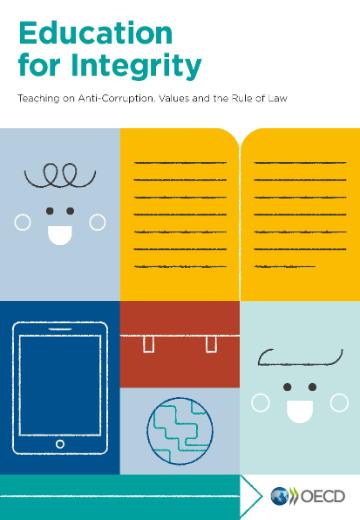Anti-corruption and integrity in the public sector
Education for Public Integrity
|
By teaching people about public integrity we give them the knowledge, skills and behaviours to fight corrupt practices and establish new behavioural norms and values for society. The OECD’s work on education for public integrity will harness young people's natural desire for fairness and equity. The goal being sustainable cultures of integrity and a better future for all.
Report is available here pdf
EDUCATION FOR INTEGRITYEducation for Integrity is the new OECD resource for teachers interested in effective methods for teaching for public integrity and anti-corruption. The book provides a comprehensive framework for implementing education for public integrity in the school system and in the classroom. It also contains useful sample lessons and tasks on anti-corruption, values formation and understanding the rule of law.
SECTION 1 - ANTI-CORRUPTIONEmpowering our youth to fight corruption begins with ensuring that they understand how to recognise it. This section of Education for Integrity includes lesson plans and tasks to help young people understand corruption’s causes and consequences, and introduce them to concepts such as the value of proper processes and the need for transparency. See the following example of a task that teachers can set for students: |
|
||
|
Corrupt Behaviour: A Question of Degree Which of these terms - Corruption, Bribery, Illegal, Wrong, OK - apply to the following situations:
SECTION 2 - INTEGRITY & VALUESWhen corruption and unethical behaviour become part of everyday life, it is critical to establish what public integrity is and why it matters. This section of Education for Integrity helps educators develop lesson plans and tasks that teach students how to define and identify values, and how to find solutions to ethical dilemmas. See the following questions that teachers can set for studends: Ethical Dilemmas: What Would You Do?
SECTION 3 - THE RULE OF LAWThis section provides educators with lesson plans and tasks to help students understand how rules and laws protect all members of society, and why rules and laws must be obeyed - even when no one is watching. See the following example from the publication: Understanding the Rule of Law Let us help young people understand the rule of law so that they can better respect it. Should there be exceptions to the rule of law? Answer these critical questions:
|
|||
Blogs on the topic
- Values education for public integrity - U4 Anti-Corruption Resource Centre
- Education for integrity: our youth, our future - ETICO integrity
Related Documents
